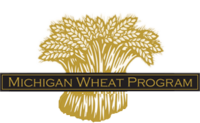Gov. Snyder makes final appointments to the Michigan Wheat Program board
Lansing, Mich. (June 22, 2018) – In the last wheat check-off appointments of his career, term-limited Governor Rick Snyder’s office has just announced the 2018 appointments for the three expiring seats on the board of directors for the Michigan Wheat Program. One new member and two re-appointments will join the nine-member wheat check-off board.
“We have appreciated the Governor’s support for continuity on the board of the Michigan Wheat Program, which was voted into existence early in the Governor’s first term,” said David Milligan, chair of the Michigan Wheat Program and a Cass City farmer. “Having a handful of board members that were on the wheat exploratory committee, and then having re-appointments of many of our members has helped us establish a clear vision and a successful track record for the program.”
“With that said, we are also pleased to welcome another new, well-qualified board member in Jason Dunning of Fremont,” Milligan concluded.
Appointments to fill the three expiring seats are as follows:
Newly Appointed:

Jason Dunning, Fremont (District 1) – A new board member, Dunning is an acting partner in Dunning Farms, LLC, a 5th-generation family farm with 1,200 acres of feed and cash crops, including 200 acres of wheat, and 900 dairy heifers. Dunning is also an agronomist and sales representative for Wilbur-Ellis Company. He holds a B.S. in agri-business management from Michigan State University. Dunning replaces original board member Dean Kantola of Ravenna.
Re-appointed:

William Hunt, Davison (District 4) – Returning to the board is Bill Hunt, who has owned Hunt Farms, Inc., for 42 years. Hunt grows soybeans, corn and wheat, and is also involved in the transportation end of the agriculture supply chain. He also operates a small trucking fleet that services elevators and farms. Hunt serves in numerous volunteer and leadership positions within the community, including as an executive board member of the Genesee County Farm Bureau. Hunt has served on the board since 2011.

Art Loeffler, CPA, Miller Representative, Frankenmuth (District 9) – Also returning to the board is Art Loeffler, president of Star of the West Milling Company, one of five major milling organizations in Michigan that add value to wheat grown here. Loeffler previously served as an internal auditor for Kraft Foods, auditor for the Yeo & Yeo CPA firm, and controller of Star of the West. He served as mayor pro-tem on the Frankenmuth City Council and is past president of the Michigan Millers Association. He holds a BA in business from Michigan State University and has represented the milling industry on the Michigan Wheat Program board since the program was established in 2011.
Each of these three seats on the nine-member wheat check-off board expires May 31, 2021.
Officers elected
Following the announcement of the Governor’s appointments, at its June 29 meeting the Michigan Wheat Program board re-elected Dave Milligan as chairman; elected Bill Hunt as vice chair; re-elected Art Loeffler as board secretary; and re-elected Frank Vyskocil as board treasurer.
The Michigan Wheat Program was created and voted in by the state’s wheat farmers in 2011, and re-authorized in 2016, as a commodity check-off organization to advance the interests of wheat grown in the state. The program is authorized by Michigan Public Act 232, which allows farmers who grow and sell wheat to tax themselves to support a check-off.
Wheat program funds are used on behalf of the industry for research, education, communication and market development. The full legal program may be reviewed at http://www.miwheat.org/site/wp-content/uploads/enabling-purpose-Michigan-Wheat-Program-Final-9-1-2011.pdf.
The Michigan Wheat Program is funded by nearly 8,000 farmers who grow wheat in 50 of Michigan’s 83 counties. The Michigan Wheat Program board seeks to promote the state’s wheat industry by funding and supporting the strategic priorities of wheat farmers working with input suppliers, seed producers, millers, end users and consumers. Research on wheat production practices and grower education has been an early priority for the organization.

